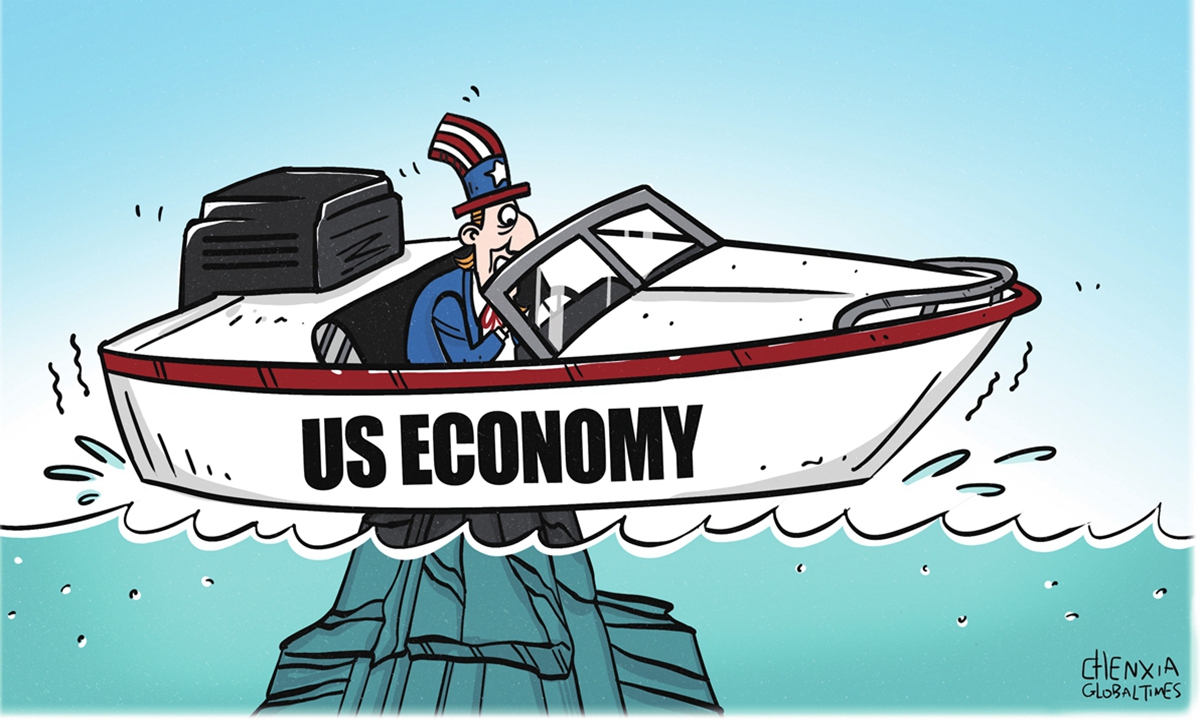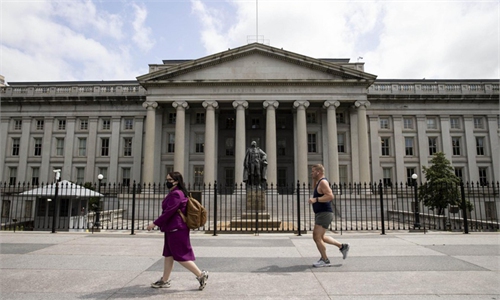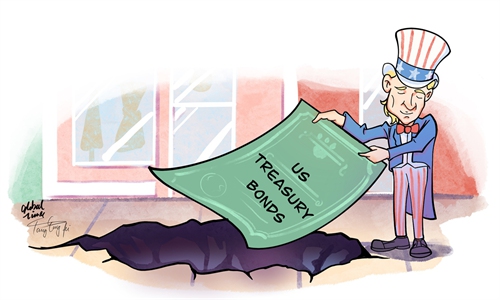Large US debt raises concerns about more extreme US policies and possible instability

Illustration:Chen Xia/Global Times
According to a US Treasury Department report released on Tuesday, the US' gross national debt has surpassed $31 trillion, edging closer to the statutory ceiling of roughly $31.4 trillion put in place by Congress limiting the government's ability to borrow, AP reported.
First, it's clear that the US economy is in far less rosy shape than what many had forecast, with debt now trillions of dollars higher than its GDP, which was only about $23 trillion last year. Starting around 2013, US debt began to steadily outstrip GDP. After 2020, it jumped to about 125% of the year's GDP, quickly soaring up to nearly 135% in 2021. As the rate of borrowing continues to climb, the unhealthy ratio of debt to GDP is expected to continue rising over coming years.
On the one hand, the Biden administration hopes to suppress inflation, which will likely drag down the US economy and employment. On the other hand, if the government chooses to stimulate the economy by increasing debt scale, investors will face greater pressure like rising capital cost, ultimately dampening economic growth prospects. It will be therefore difficult for the US government to balance economic recovery and runaway inflation, Bai Ming, deputy director of the international market research institute at the Chinese Academy of International Trade and Economic Cooperation, told the Global Times.
"The US debt ceiling has been raised many times, which, to a large extent, will also have an impact on the US financial markets, objectively playing a negative role by adding fuel to the fire on top of interest rate hikes."
Second, the total debt of $31 trillion also indicates that there will be more intense political combat on issues related to congressional appropriations in Washington, which means almost all major federal projects and initiatives will be difficult to deliver, affecting the country's internal economic vitality and its external influence. In addition, Bai noted, the last time the US debt was this close to its ceiling, the government was nearly forced to shut down, and the increasingly high debt will also harm the basic operation of the federal government.
Third, an increasing debt burden will naturally raise concerns about the ability of the US government to service the debt, and even the possibility of extremes in future US internal and external policies, such as provoking volatility, unrest or even a war oriented foreign policy to shift or even find ways to renege on its debt, which has indeed happened in US history. This sentiment alone could potentially undermine the full faith and credit of the US.
The Congressional Budget Office earlier this year released a report on America's debt load, warning in its 30-year outlook that, if unaddressed, the debt will soon spiral upward to new highs that could ultimately imperil the US economy, according to an AP report.
Moreover, the current level of inflation in the US should not be underestimated, coupled with high oil prices, the energy disputes between the US, Europe and Russia, as well as the Russia-Ukraine conflict and other complex international situations, the challenge of a $31 trillion national debt should be considered in the context of the risky crises currently facing Washington. If the persistent upward trend cannot be resolved, the attractiveness of the US as a global pool of capital and talent will be further eroded, hitting its strength in all aspects.
However, it's important to note the reality that the US is accustomed to adopting various policies to deflect conflicts, leaving ordinary Americans and other countries to bear the ultimate cost. The US is not playing the role of a stabilizer in the global economy that a major power should do. Instead, it has repeatedly held others accountable for the consequences when it makes mistakes. As the birthplace of several post-World War II global economic crises, the US could once again become a chaos maker at the expense of economic development around the world, given that the debt as well as its economic and monetary policies all raise the possibility of another global financial crisis in the future.
The author is a reporter with the Global Times. opinion@globaltimes.com.cn


